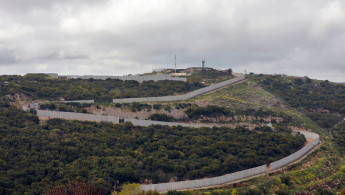Residents return to Lebanese border as cautious calm prevails
Displaced residents returned to their homes on the Lebanese border over the weekend as a cautious calm prevailed between Hezbollah and Israel, the first lull in fighting since clashes broke out six weeks ago.
Though Israel and Hezbollah did not make a formal agreement, the four-day ceasefire between Israel and Hamas has tempered clashes on the Lebanese border since Friday – with only one exchange of fire reportedly occurring in the early hours of Saturday morning.
Residents of border towns have taken advantage of the tenuous peace to visit their homes, check on their belongings, as well as tend to their crops and livestock.
Abu Mohammed, a resident of the southwestern border town of Aita al-Shaab, picked through the rubble of his son's home, the wreckage of an Israeli missile sitting in the living room, the furniture all burned to ash.
His son was cooking in the kitchen when an Israeli drone struck his home on 21 November, the impact breaking his cheekbone and embedding shrapnel in his eye – hospitalising him.
"He should have been killed, but he was protected by God. I told him not to come back to the village, but you know how young men are," Abu Mohammed told The New Arab on Friday.
In the nearby border town of Dahayrah, the mood was festive, as some 80 percent of the residents returned, eager to see their homes after over a month of displacement.
The town was shelled extensively and was almost entirely depopulated after Israel used white phosphorus on it on 17 October.
"We will make coffee in our own homes today … Come join us, though there might be some white phosphorus in the water," Rita, a Dahayrah resident joked on Saturday.
Officials said that the informal ceasefire would also provide a crucial window for farmers in border areas to harvest their crops and take them to market.
The border clashes erupted in the middle of Lebanon's olive harvest. They also prevented farmers from accessing warehouses where they stored already harvested tobacco.
Still, danger remained for farmers despite the reduction in fighting.
Farmers had to coordinate with UNIFIL – the UN peacekeeping force in south Lebanon – in order to ensure their fields were free of unexploded munitions dropped by Israel, Mohammed Husseini, the head of the Union of South Lebanon farmers, told TNA.
Olives harvested also needed to be subject to new cleaning procedures, as those in border areas could carry remnants of white phosphorus and its highly toxic smoke, Husseini explained.
Not all of those who returned to border areas were eager to stay, however, expecting the fragile peace that prevailed on Friday and Saturday to be broken at any moment.
Iman Reda, a 39-year-old mother of three from Aita al-Shaab, returned with her children just to collect some belongings and see her neighbours, eager to leave back to the nearby city of Sour before nightfall.
"I don't trust Israel, even if they did say there would be a ceasefire. I don't have a problem staying personally, but I have children and they're scared," Reda told TNA.





 Follow the Middle East's top stories in English at The New Arab on Google News
Follow the Middle East's top stories in English at The New Arab on Google News


